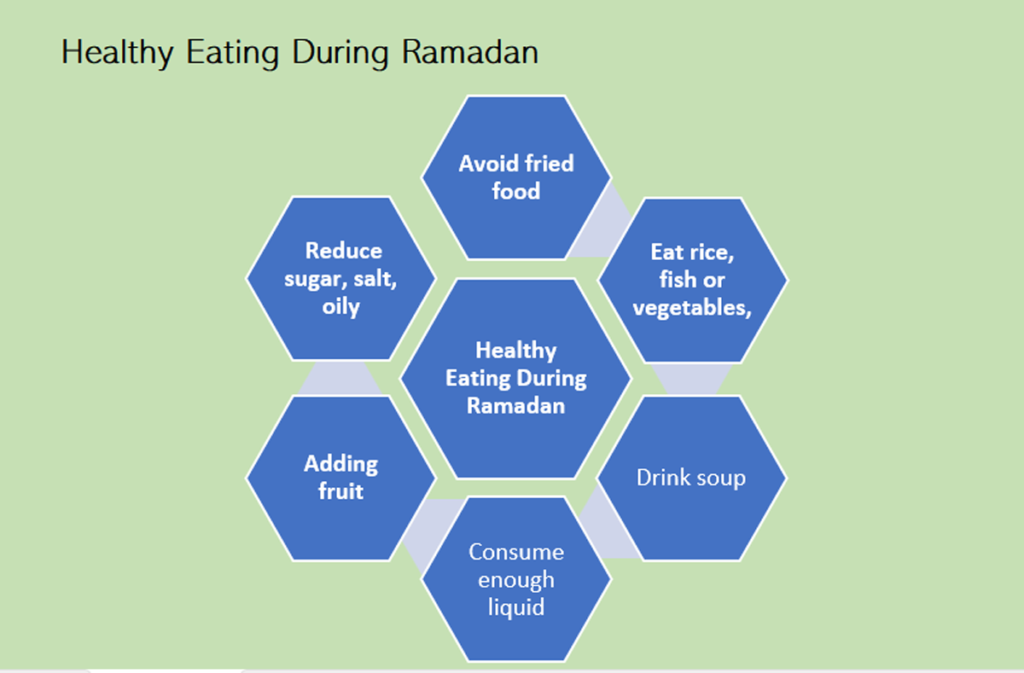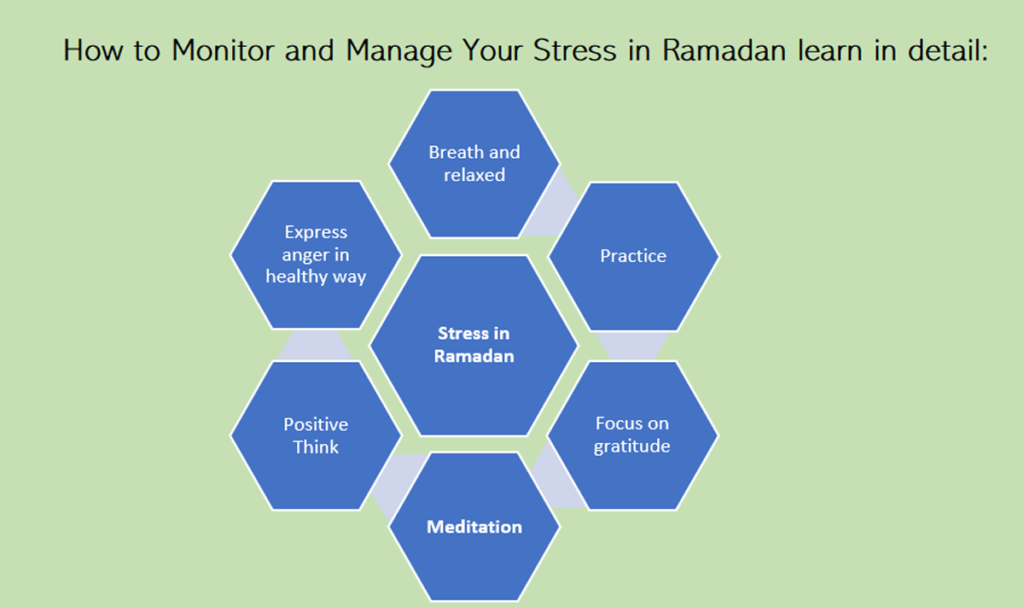
Stay healthy during Ramadan learn in details.
Introduction:
Ramadan, Islam holy month in the Arabic calendar, Ramadan means fasting from dawn to dusk. After long fasting how to Stay healthy during Ramadan learn in details in this article. Ramadan is a time of spiritual reflection. Observing Ramadan is a significant and rewarding experience for millions of Muslims worldwide. The holy month of Ramadan started on March 12 (Tuesday). Many are worried about balancing daily exercise with body nutrition this month. However, prolonged fasting can present challenges to maintaining good health.
Let’s find out what we can do to stay healthy during Ramadan – enabling you to fully embrace the spiritual essence of this holy month.
Importance of Nutrition in Ramadan learn in details:
Stay healthy during the Ramadan abstaining from food and drink during approximate 14 hours. As such, it’s crucial to prioritize nutritious meals during Suhoor (pre-dawn meal) and Iftar (evening meal) to sustain energy levels throughout the day. Incorporate complex carbohydrates, protein, healthy fats, fruits, and vegetables into your meals to promote satiety and provide essential nutrients. Dehydration can be a common concern during fasting hours, especially in warmer climates or for individuals engaging in strenuous physical activity. To fill up dehydration, drink plenty of water during non-fasting hours, particularly between Iftar and Suhoor. Avoid excessive caffeinated and sugary beverages, as they can exacerbate dehydration.
Proper nutrition during Ramadan and what to eat in Iftar learn in detail?
Stay healthy during in the Ramadan at Iftar, you must choose food that will keep you energetic. It will help you keep the next fast. Many people start their Iftar with a glass of water and a date. Then, we usually eat some liquid food like homemade fruit or juice. Soft foods like chira and curd, especially muri, act as carbohydrates. You can also take bread and rice as carbohydrates. Fish, meat, dairy products, and eggs can also be good protein sources.
Seasonal fruits must be on your iftar menu. Because we get essential vitamins, minerals, and antioxidants from fruits. Instead of fried food, as always, I can make beautiful items with vegetables and eat them for Iftar.
What is healthy Eating During Ramadan learn in detail?

Stay healthy during in the Ramadan also, remember that if an egg is on the food list, you will get more nutrition. Instead of fried food, you can eat rice, fish or vegetables. You can also eat bread, vegetables, fish, or meat. In the rest of the days except for the fasting month, adding fruit and syrup to your breakfast food becomes a good quality Iftar.
Diet is essential to keep yourself healthy and strong. So you must be careful when eating food and doing daily activities this month. We can keep our bodies healthy only by following some things.
Reduce sugar, salt, oily, and spicy foods from the diet. Avoid biscuits, cakes, chips, and cold drinks, Which will help to improve digestion. Thirst and lousy breath will decrease as a result of this diet. If the mood is wrong, it will get better.
Exercise, Prioritize Rest and Sleep in Ramadan. Learn in detail:
Engaging in moderate exercise can help you stay healthy during Ramadan. It’s essential to choose the right time for physical activity. When your energy levels are highest, aim to schedule workouts during non-fasting hours, such as before Suhoor or after Iftar. C
Engaging in moderate exercise can help you stay healthy during Ramadan. It is not safe to sit for long periods of time. It’s essential to choose the right time for physical activity. When your energy levels are highest, aim to schedule workouts during non-fasting hours, such as before Suhoor or after Iftar. Cardiovascular exercise, strength training, and exercise are essential for maintaining overall fitness and well-being. Adequate rest and sleep are integral to maintaining good health and vitality during Ramadan. At least 7-8 hours of sleep is required for physical and mental well-being. Create a routine for sleeping every day and sleep according to the rules. Create an optimum sleep environment by keeping your bedroom dark, silent and comfortable.
ardiovascular exercise, strength training, and exercise are essential for maintaining overall fitness and well-being. Adequate rest and sleep are integral to maintaining good health and vitality during Ramadan. At least 7-8 hours of sleep is required for physical and mental well-being. Create a routine for sleeping every day and sleep according to the rules. Create an optimum sleep environment by keeping your bedroom dark, silent and comfortable.
How to Monitor and Manage Your Stress in Ramadan learn in detail:
Since fasting is required for a long-time during Ramadan, the body may feel a little tired. So, stress reduction can help you stay healthy during Ramadan. Perfect Practice stress-reduction techniques such as deep breathing, meditation, yoga, or engaging in activities help you joy and relaxation. Need prioritize self-care activities that nourish your mind, body, and soul, helping you navigate the challenges of fasting with resilience and grace. Pay attention to your body’s signals and monitor key health indicators during Ramadan. Keep track of your weight, hydration status, energy levels, and any symptoms of fatigue or discomfort. If you experience persistent health issues or concerns, consult with professional for personalized advice and guidance.
Practice healthy habits during Ramadan. Learn in details:

Ramadan is the month of moderation. To stay healthy during Ramadan, you should practice a healthy lifestyle during that time. Eat healthy food. Make it a practice to get rid of all injustices in life. Maintain good relations with people. stay healthy A diet with religious fervor. Many people try to lose weight by being moderate about food during Ramadan. Excessive drinking can be dangerous. So, to stay healthy and beautiful, follow a religious diet. Since there are specific times for meals and breaks during this month, make use of this opportunity. Make a list of food requirements and eat accordingly. Get emotional satisfaction. Donate according to your ability, collect donations, and give to those who need it. Feed hungry people. In this way, you can get peace of mind and satisfaction.
Conclusion:
Observing Ramadan is a profoundly significant spiritual practice for Muslims around the world. Staying Healthy During Ramadan, learn in detail from this article and be healthy to yourself. By adhering to healthy eating habits, staying hydrated, and exercising caution in all activities, individuals can safeguard their health throughout the fasting period. Practicing mindfulness, managing stress effectively, and seeking medical attention for any health concerns contribute to a safe and fulfilling Ramadan experience. Remember to listen to your body, pace yourself, and pursue support from loved ones and healthcare experts when needed. By embracing these proactive measures, you can navigate Ramadan with confidence, gratitude, and a deep sense of beautifully engaging in this blessed month’s spiritual significance.
Md. Abdul Aziz (DMDS)
Content writer
Source: Online
